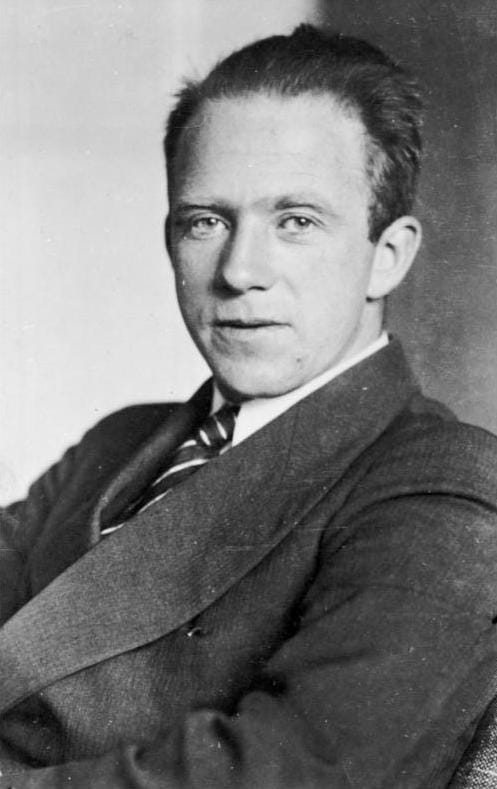Werner Heisenberg (1901-1976) was a German physicist renowned for his contributions to quantum mechanics. He formulated the uncertainty principle, asserting the inherent limitations in simultaneously measuring certain pairs of properties like position and momentum of a particle. Heisenberg received the Nobel Prize in Physics in 1932 for his groundbreaking work. His ideas significantly influenced the development of quantum theory, shaping our understanding of the fundamental nature of particles at the atomic and subatomic levels.
Heisenberg’s interest in physics was sparked at an early age, influenced by his father’s passion for ancient Greek philosophy and his mother’s love for literature. He pursued his academic interests at the University of Munich, studying physics under the guidance of renowned physicists like Arnold Sommerfeld. Heisenberg quickly distinguished himself, and by the age of 22, he completed his doctorate, presenting a groundbreaking thesis on turbulence in fluid dynamics.
In 1925, Heisenberg joined Max Born’s Institute for Theoretical Physics at the University of Göttingen. It was during this time that he made his most significant contributions to quantum mechanics. In collaboration with Max Born and Pascual Jordan, Heisenberg formulated matrix mechanics, a mathematical framework that provided a systematic way to describe the behavior of quantum systems.
The trio’s work laid the foundation for a new understanding of atomic and subatomic phenomena, challenging classical physics. This revolutionary approach introduced the concept of quantized angular momentum and dispensed with the classical trajectory of particles. Heisenberg’s matrix mechanics and Erwin Schrödinger’s wave mechanics, developed concurrently, were later shown to be equivalent.
In 1927, Heisenberg published his groundbreaking paper introducing the uncertainty principle. This principle states that certain pairs of properties, such as the position and momentum of a particle, cannot be precisely simultaneously measured. The more accurately one property is known, the less precisely the other can be determined. The uncertainty principle marked a departure from classical determinism, fundamentally altering the philosophical underpinnings of physics.
Heisenberg’s work on quantum mechanics earned him the Nobel Prize in Physics in 1932, making him the youngest recipient of the prize at that time. The Nobel Committee acknowledged his creation of quantum mechanics and his development of matrix mechanics as fundamental contributions to the field.
As political tensions rose in Germany, Heisenberg faced the challenges of living and working in Nazi-controlled territory. Despite the oppressive political climate, he navigated a delicate path, avoiding direct involvement in the Nazi party’s ideologies. However, his decision to remain in Germany during this tumultuous period has been a subject of historical debate and criticism.
During World War II, Heisenberg’s involvement in the German atomic bomb project, known as the Uranium Club, came under scrutiny. It remains a contentious issue whether he deliberately obstructed the project’s progress to prevent the creation of a Nazi atomic weapon or whether his intentions were more ambiguous. The lack of a successful German atomic bomb, coupled with Heisenberg’s subsequent statements and actions, has fueled ongoing discussions about his role during this critical period.
After the war, Heisenberg faced intense scrutiny and was detained by the Allies for six months. He was eventually released, and his contributions to physics were recognized once again. He played a crucial role in rebuilding the scientific community in Germany and participated in international efforts to reestablish scientific collaborations.
In the post-war years, Heisenberg returned to academic life and became director of the Max Planck Institute for Physics in Göttingen. Later, he assumed the position of director at the Max Planck Institute for Physics and Astrophysics in Munich. He continued to contribute to theoretical physics, working on the development of the S-matrix theory and exploring the foundations of quantum mechanics.
Werner Heisenberg’s later career also included reflections on the ethical responsibilities of scientists. In a series of lectures known as the “Philosophical Problems of Nuclear Physics,” he addressed the moral dilemmas faced by physicists in the context of nuclear weapons. He advocated for scientists to consider the ethical implications of their work and emphasized the need for responsible decision-making.
Heisenberg’s contributions to physics extended beyond his scientific achievements. His reflections on the philosophy of science, coupled with his experiences during the Nazi era, provided valuable insights into the intersection of science, ethics, and politics. He continued to be an influential figure in the scientific community until his retirement in 1970.
Werner Heisenberg passed away on February 1, 1976, leaving behind a legacy that transformed the landscape of modern physics. His uncertainty principle remains a cornerstone of quantum mechanics, shaping the way physicists perceive the behavior of particles at the quantum level. Heisenberg’s life and work stand as a testament to the complex interplay between science, politics, and ethics, and his contributions continue to influence the ongoing exploration of the fundamental principles governing the universe.
